JOBURG RAIDED
Inner-city residents challenge Mashaba’s ‘unlawful’ building raids
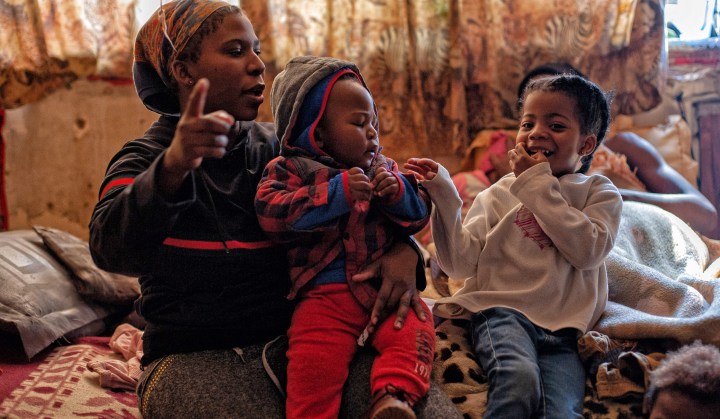
Dozens of Johannesburg inner-city buildings have been raided by police, led by Mayor Herman Mashaba’s administration. Residents feel harassed and abused. Their lawyers say the City is trying to bypass the law to evict them – Mashaba says the raids are vital for development.
The August family live in a small room in Industry House, Doornfontein. Each night, six adults and three children under the age of six fill the room’s only bed and spread out to sleep on the floor. Clothes hang from walls made of discarded chipboard. A TV sits next to the family’s plastic kitchenware.
In May, police raided the building for the fifth time in a year. Officers ordered the family outside, refusing to let the women change out of their nightgowns before they went into the cold night. The August children, aged one, three and five, clutched their mothers.
“We were ordered out in our panties and the children were very terrified,” said 27-year-old Constance August, as the children played in the room the family has lived in since 2009.
Since early 2017, the City of Johannesburg has conducted dozens of raids on dilapidated inner-city residential buildings after Mayor Herman Mashaba promised to reduce crime, increase the availability of low-cost accommodation and grow the city’s economy.
Residents of raided properties have found themselves victims of the latest policies on addressing inner-city decay and providing for the people who not only live on the margin, but call it home.
About 428 people live across the five floors of Industry House. Rooms are divided by broken chipboard. The toilets don’t function and a bathroom reeks of faeces and the urine that glistens on the ground. There is an illegal electricity connection that is often disconnected by City authorities. Graffiti is scrawled in the stairwells.
Zwelitsha Mhlongo is 46 years old and arrived in Doornfontein in 2010. His family lives in a concealed room, through an unlit passage and over a ledge. Mhlongo recently recounted the raids on Industry House. His daughter had just returned from school as three of his kids sat with their mother in front of a heater.
“The officers came around 3am under the pretext that they had come to raid the area. I saw their cars lining up on the street and before I knew it they started banging on doors and asked occupants to step outside with their papers or IDs. They kicked down doors in other rooms,” said Mhlongo.
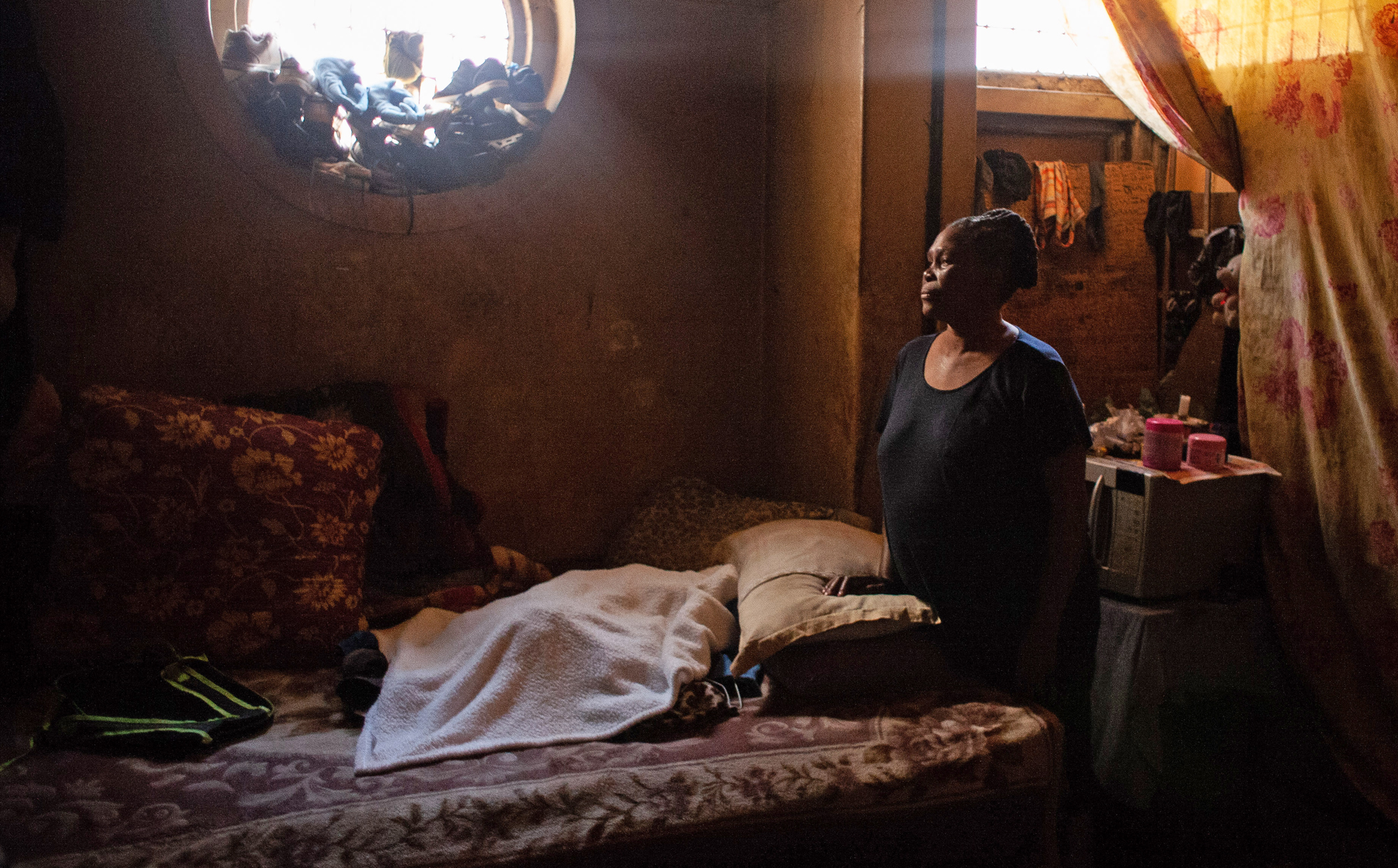
Jabu Qwabe, 51, in her room in Berea at one of the properties that has been raided by the police in an ongoing operation led by the City of Johannesburg targeting unsafe and hijacked buildings. (Greg Nicolson)
He has been arrested and released multiple times during five raids on Industry House. He and others on the residents committee have been accused of hijacking the building, while the police are accused of specifically targeting leaders who have gone to court to oppose their eviction.
Mashaba’s office sends press statements after many of the raids. In a statement on Industry House, the mayor said the operation was led by the City’s Group Forensic and Investigation Services Unit, in conjunction with the SAPS, JMPD, the Department of Home Affairs, Emergency Management Services and a host of City departments.
“Criminals must know that they might run but there is no place for them to hide in Johannesburg,” said Mashaba in May 2018 after a raid.
“The City will not leave any stone unturned when dealing with criminal activities within its area of jurisdiction and we will continue to intensify the raids at these bad and hijacked properties with the assistance of the SAPS and other law enforcement agencies.”
It is clear the raids are not only about crime, but also housing and development. The City says there are 500 “bad buildings” in the inner city, 300 of which are hijacked. Mashaba has offered multiple motivations for the raids: To target hijacked buildings, “stop the rot” and revitalise the inner city, conduct socio-economic needs audits, pursue criminals, and arrest undocumented foreigners.
The Socio-Economic Rights Institute has applied to the South Gauteng High Court to challenge the legality of the raids. Representing residents of 11 raided buildings, searched 20 times between June 2017 and May 2018, it argues the raids were unlawful and the City has been lying about its intentions. The institute documented at least 39 raids on buildings during the year-long period.

A room in a building in Jeppestown, one of the properties that has been raided by the police in an ongoing operation led by the City of Johannesburg targeting unsafe and hijacked buildings. (Greg Nicolson)
Residents in each of the 11 buildings the institute represents have fought eviction cases in recent years. All have or are occupying properties unlawfully. The institute’s director of litigation, Nomzamo Zondo, believes residents of other raided buildings are also likely to face eviction.
“First, we think these raids are meant to make the residents’ lives unbearable so that they move elsewhere without the City meeting its constitutional obligation to provide them with alternative accommodation,” said Zondo.
“Quite early on, property owners acted as if this was what the City was communicating to them. A secondary motive has been to terrorise immigrants without following the conditions set out in the Immigration Act,” she said.
Speaking in December 2016 about his first 100 days in office, Mashaba accused “so-called human rights lawyers” of “using the courts to keep people under these conditions to the benefit of the slum lords”. It was a direct criticism of the Socio-Economic Rights Institute and other legal rights non-profits’ attempts to enforce the law in Johannesburg, which can stifle heavy-handed municipal policies aimed at rapidly rejuvenating the inner city.
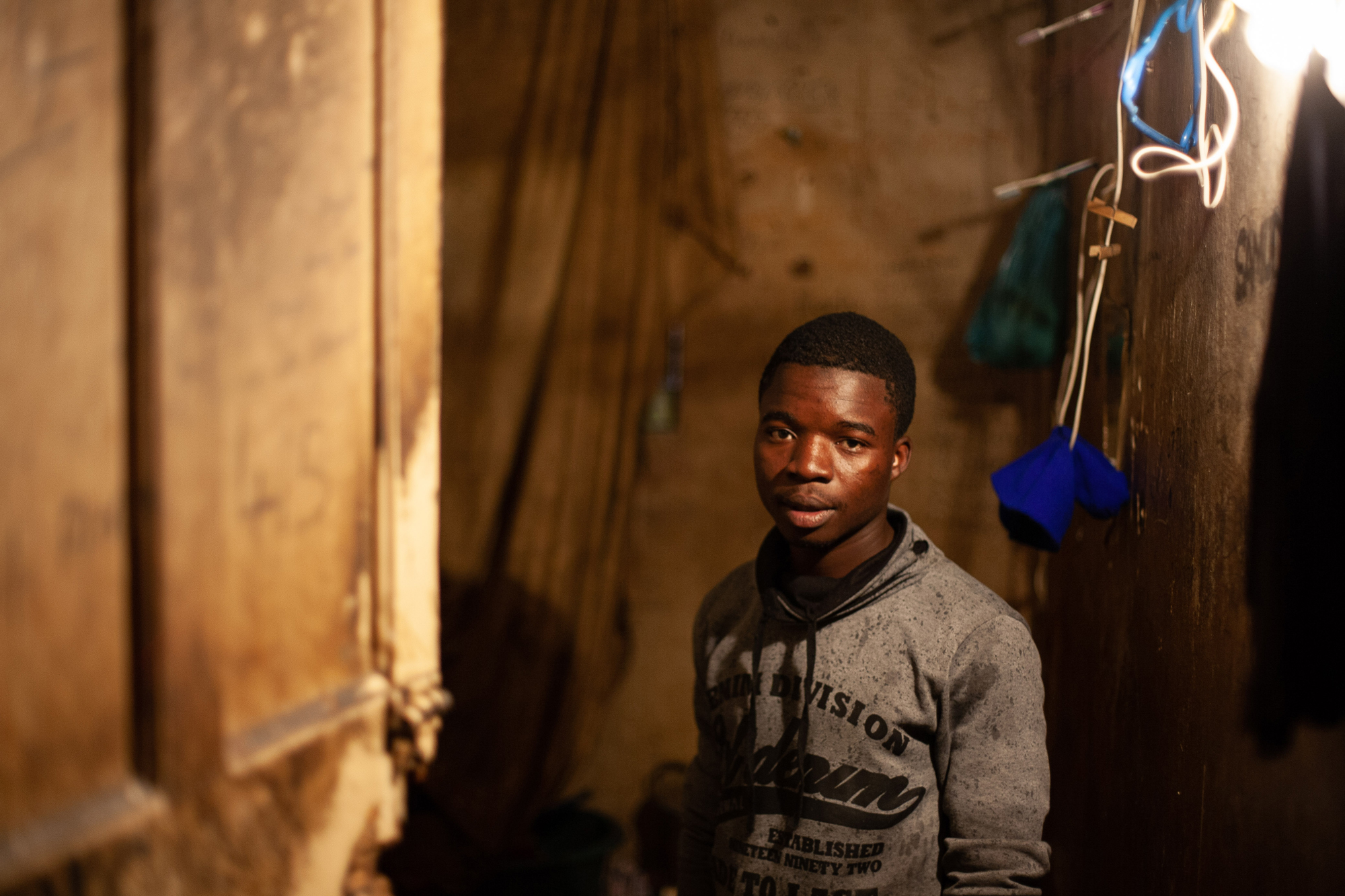
Anussa Shifundo in his room at Industry House in Doorfontein, one of the properties that has been raided by the police in an ongoing operation led by the City of Johannesburg targeting unsafe and hijacked buildings. (Greg Nicolson)
Speaking recently after three firefighters died battling a blaze at the provincial government’s Bank of Lisbon building, which did not meet safety standards, Mashaba said the City had to “carry out raids so that we take back the city” and avoid another disaster.
“Where we cannot find the owners, we must expropriate these buildings. Where we can find them, we will put them on terms so that they can renovate these buildings so they meet our safety and health standards,” said the mayor, referring to the 500 buildings the City is targeting.
The raids and efforts targeting dilapidated buildings fit neatly into Mashaba’s efforts to provide housing. The City faces a housing backlog of almost 300,000 units, while an estimated 3,000 people migrate to Johannesburg every month. Johannesburg already has an estimated 190 informal settlements.
Mashaba’s administration has been aggressively targeting buildings where owners have failed to pay their outstanding rates and services, that have been hijacked, abandoned, or are dilapidated. Either by taking control of buildings or working with property owners, the municipality is seeking to allow private developers to provide low-cost housing, student accommodation or business rental space.
Residents of raided buildings believe they’re being targeted so the City can hand over buildings to developers while it avoids having to provide temporary emergency accommodation, which it is legally required to do for those who will be rendered homeless as a result of an eviction.
JMPD and SAPS officers arrived at 50-54 Soper Street, Berea, on 31 August 2017. No fence separates the three adjoining houses. Mounds of green beer bottles rise throughout the yard. A man smashed one pile with a shovel and scooped the shards into a recycling bag. The three houses have an estimated 80 residents.
One house is half demolished, another has fire damage. There is a tap with running water outside, but no electricity. Mattresses and old blankets lie in the yard and a portable toilet sits outside each house. Toddlers play, skirting a pile of wood used for cooking.
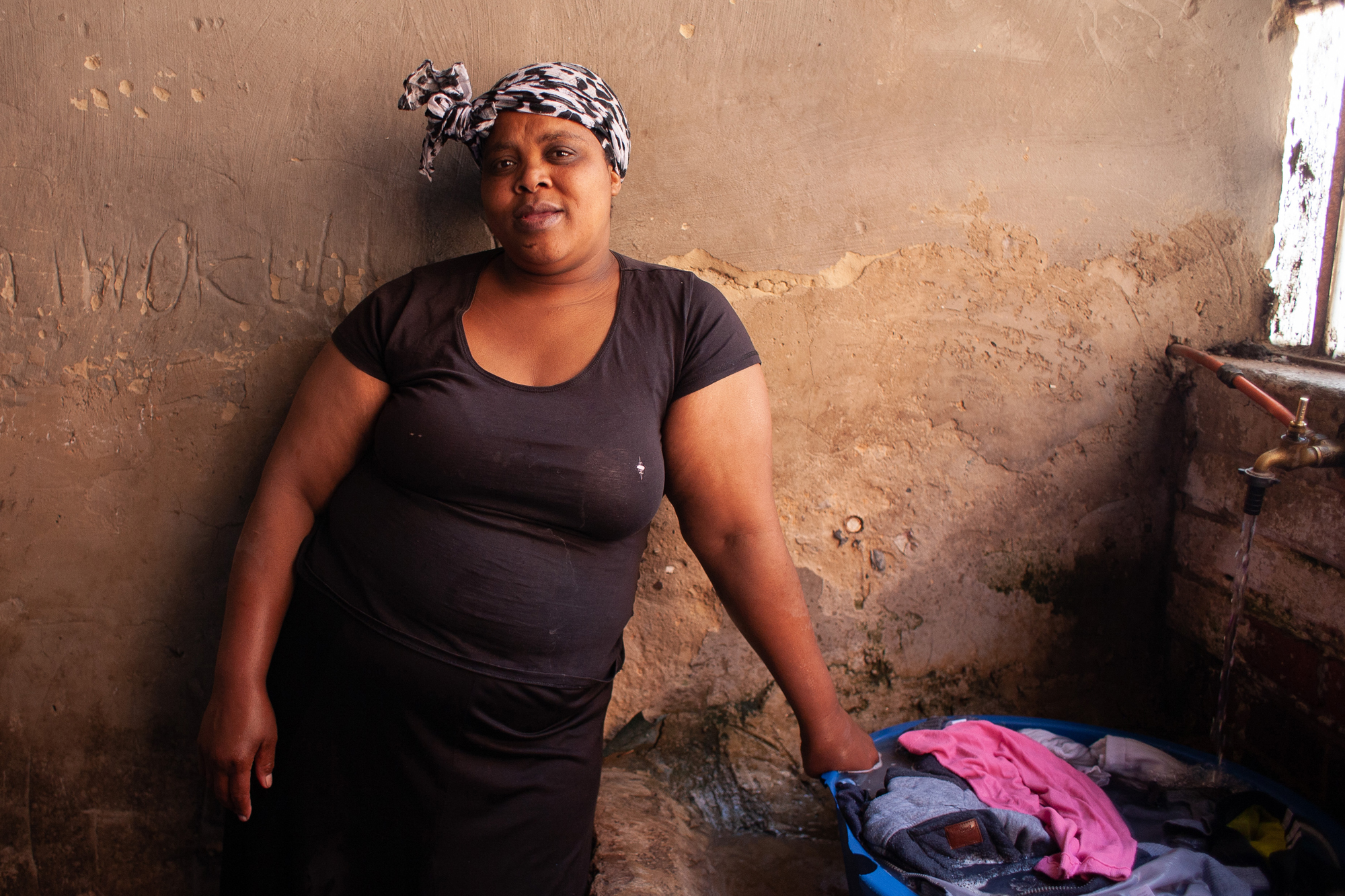
Ntombekhaya Njiyela in the Jeppestown building where she lives, one of the properties that has been raided by the police in an ongoing operation led by the City of Johannesburg targeting unsafe and hijacked buildings. (Greg Nicolson)
“They want to clean the inner city, to make it clean. We are the nuisance that makes it dirty. The only thing I know is the human rights say we have a right to water, we have a right to electricity, but Mashaba doesn’t care about that,” said 35-year-old Annelise Ruiters, who has lived in one of the houses for four years with her two children.
“He must come and see people struggle, to see baby kids running around.”
Sitting on the veranda, Thembisile Majozi added, “I’m not sure what Mashaba wants to do with these buildings. I think his intention is to throw us out in the street because clearly there is no place that is being prepared for us. Despite that, we have been warned that we are not wanted here. This is not sitting pretty with me because it’s clear that one day we will be thrown out in the streets.”
When the police arrived in August, they searched each room of the Soper Road houses and fingerprinted residents, who have fought an eviction order from the owner. The Socio-Economic Rights Institute said the situation is “particularly desperate” and residents have sought alternative accommodation from the City, “which has failed, for a number of years, to do anything”.
“Staying here is tough. I just have nowhere else to go. If I had I would have left a long time ago with my five children,” said Thulisile Manqele, washing laundry on the Soper Road veranda.
“Mashaba wants to kick us into the streets and develop the buildings for people who can afford to pay rent.”
Mashaba’s spokesperson Luyanda Mfeka denied the raids were meant to evict residents without following the law.
“At no point has a policing operation of this nature resulted in the eviction of persons within the building. A claim to the contrary is baseless,” he said.
He said the raids were part of ordinary policing operations on “suspected hijacked and bad buildings” and were aimed at promoting safety for residents and the community.
On the government departments involved, he said the reason for the “multi-purpose” approach was to collect data on the occupants living in the buildings, including sex, age and employment status.
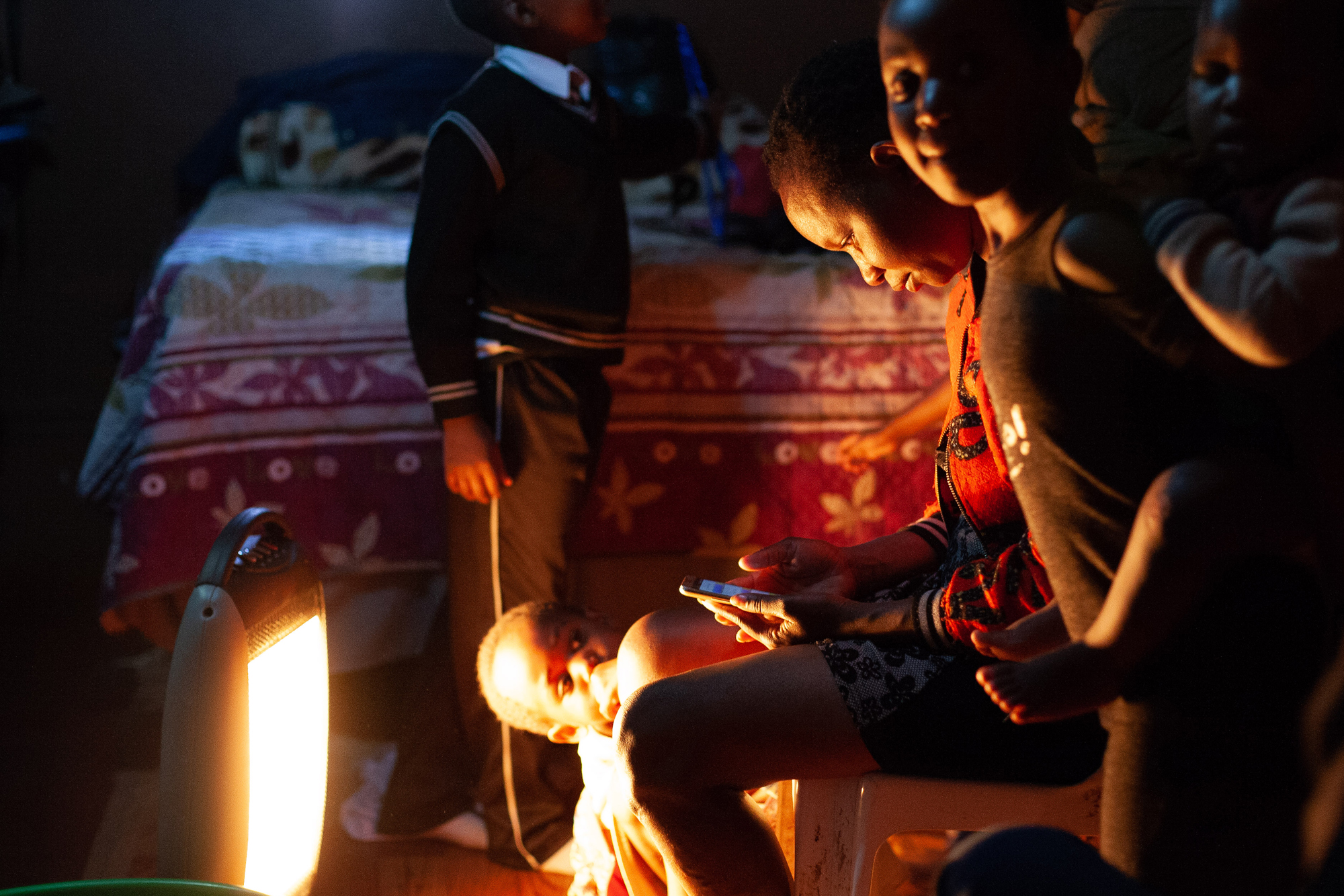
The Mhlongo family in their room in Industry House, one of the properties that has been raided by the police in an ongoing operation led by the City of Johannesburg targeting unsafe and hijacked buildings. (Greg Nicolson)
“It is vital that we profile occupants living in these buildings and ensure that where appropriate residents can be linked to social services and that the [City] has an indication of numbers of people living within those structures so as to factor this into City planning.”
In its court papers, the Socio-Economic Rights Institute argues that the legal provision used to authorise the raids, conducted without a warrant, violates residents’ rights to privacy and dignity, and has been applied inappropriately.
“WRITTEN AUTHORISATION FOR A CORDON-OFF” reads one of the documents authorising a raid, which Daily Maverick has seen. Provincial SAPS leaders grant the “cordon-off” applications after receiving an application from a local police station citing the need to close certain streets and conduct a policing operation.
The cops offer motivation for the operation, such as the high level of priority crimes, hijacked buildings, undocumented foreign nationals, illegal shebeens and criminal hideouts in an area, and how standard policing activities have failed.
The authorisation allows police to search any person, premises or vehicle, without a warrant, and seize objects suspected of being related to crime. The directive, issued under 13(7) of the SAPS Act, means police don’t need a court order or warrant issued by a judge or magistrate to search someone’s home.
After closing off certain streets, SAPS, JMPD and immigration officials arrive at a building, force people outside while they take their details and search their rooms. Those without an ID book or a passport with a visa are detained, allegedly sometimes based on their skin tone. Residents return home to find their rooms ransacked.
“The kids were so terrified that the elder one, five at the time, asked, ‘Mum, are you getting arrested?’ ” said Jabulile Ndebele about the raid on her home at 36 Davies Street, Doornfontein.
Multiple people told Daily Maverick their valuables had been stolen.
“It involves crime. They are robbers. When you report to their boss that these officers are taking our monies, the bosses will ask where you got the money from. They take everything they come across, laptops, cash, alcohol, and everything,” said Mhlongo, from Industry House.
He said police took money from his room at Industry House during two raids. He tried to report it to the police and said they detained him briefly.
Gauteng SAPS spokesperson Lieutenant-Colonel Lungelo Dlamini said if cases of theft against officers are reported they would be investigated. Mfeka said no such cases had been reported to the City but they would be investigated if victims came forward.
The Socio-Economic Rights Institute argues that the very basis of the raids, 13(7) of the SAPS Act, was wrongly applied, is unconstitutional and that the raids should be declared unlawful. The provision allows police to cordon off an area and search people and premises without a warrant “in order to restore public order or to ensure the safety of the public”.
“There was no threat to public order or public safety posed by the applicants or their presence in their homes that were targeted in the searches. No reason was advanced during the searches for suspecting that there were such risks,” said Zondo in an affidavit.
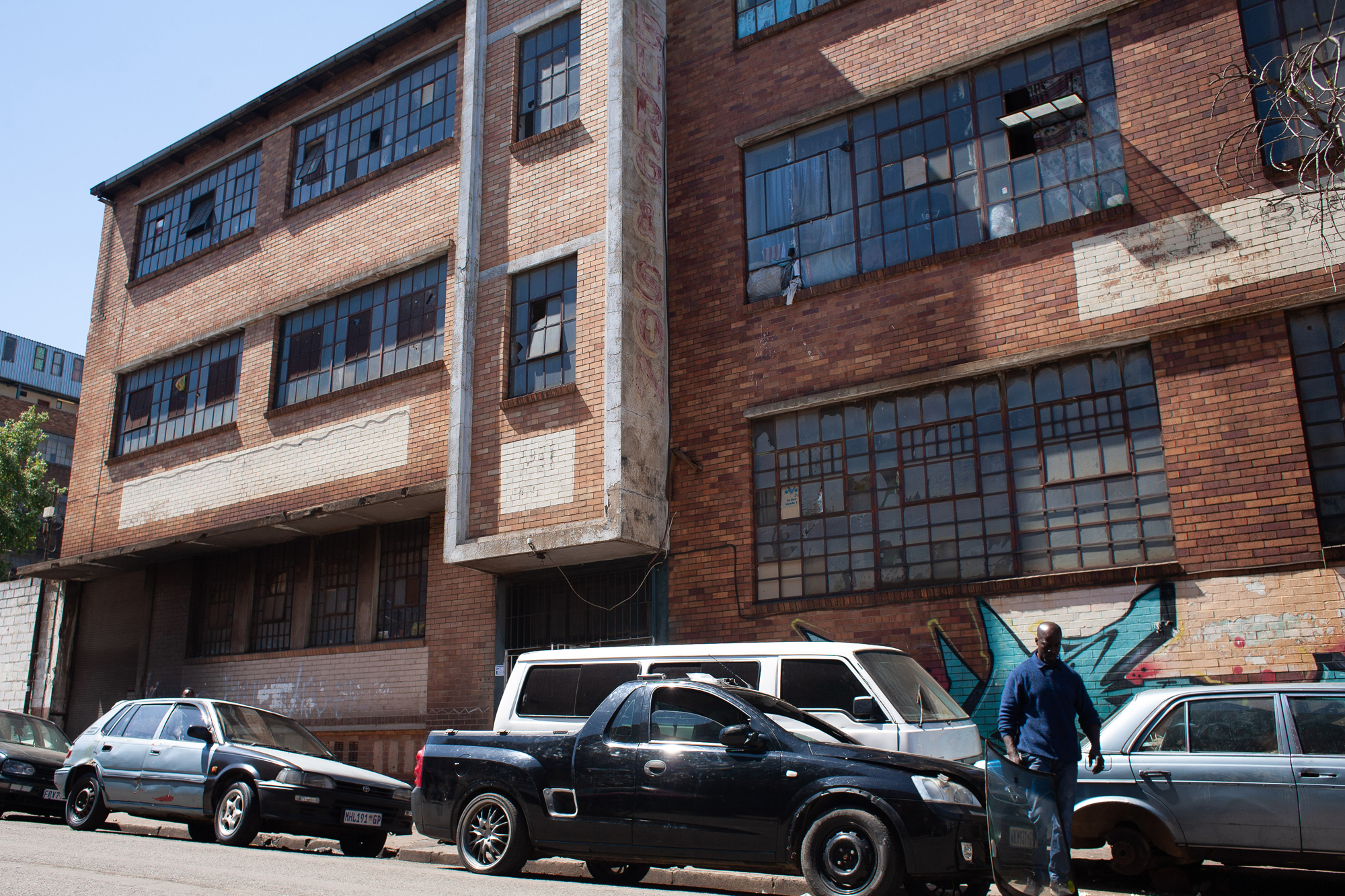
A building in Berea, one of the properties that has been raided by the police in an ongoing operation led by the City of Johannesburg targeting unsafe and hijacked buildings. (Greg Nicolson)
She continued: “The purpose of each of the decisions sought to be reviewed and set aside was clearly to allow the SAPS, JMPD, other agents of the City and the Department of Home Affairs to enter into search, inspect and question residents of various buildings occupied by the applicants. It is apparent that the raids had no specific object, crime, or regulatory purpose, other than a generalised desire to ‘raid’ so-called ‘hijacked buildings’.”
The Socio-Economic Rights Institute believes the law must change to prevent the search of homes without a warrant. It has applied for an interdict on raiding its clients’ homes and for the court to award R1,000 compensation to each of the about 2,800 residents it represents.
Dlamini from SAPS defended the police raids.
“Any action taken by the police in terms of the SAPS Act where it is reasonable in the circumstances in order to restore public order or to ensure the safety of the public in a particular area is lawful,” he said.
“Members may search any person, premises or vehicle in such an area and seize any article which may be used as evidence in terms of the Criminal Procedure Act,” he added.
The case is likely to be in court soon. After the Socio-Economic Rights Institute filed its papers, SAPS had to provide documents detailing how it decided to authorise the raids. On behalf of residents, the institute will now reply to the record of documents before SAPS, the City and other respondents will submit their replies.
Some residents have hope in the court process but feel the City is targeting them as victims of the links between inner-city dilapidation, crime and a housing shortage. Their futures are uncertain and their homes are raided because they are poor and chose the wrong address at the wrong time.
Many agree their properties are dangerous and would like to move. They are confronted by the police and offered assistance later, which despite the municipality’s promises, has not been forthcoming.
“Surely, government has lots of property to accommodate people. And if the buildings have been hijacked, as seems to be the case, surely the City has the power to reclaim them,” said 41-year-old Hlophe Dlamini from 36 Davies Street.
Dlamini’s neighbour, 34-year-old Mpho Mahlangu, said:
“We are pleading to Mayor Mashaba to obtain government property, renovate it for rent at low rates because we cannot afford the R2,000 or R3,000 flats. We did not know when we first came here that the buildings were hijacked. If we knew, we wouldn’t have stayed.”
Mashaba has announced multiple plans to provide housing, always noting the backlog and a limitation of resources. The City says it is prioritising alternative accommodation.
Zondo disagreed: “We have not seen a comprehensive plan which will address the housing challenges in the city. The City continued to ignore calls for greater access to basic services. They are still behind in the delivery of temporary emergency accommodation.”

A floor on Industry House in Doorfontein, one of the properties that has been raided by the police in an ongoing operation led by the City of Johannesburg targeting unsafe and hijacked buildings. (Greg Nicolson)
David Molefi, 60, stood on the Soper Road veranda with defeat and despair in his voice. He also called on the City to provide residents with alternative accommodation, believing it meant to evict them through continued raids or allowing the homeowner to send in the notorious Red Ants.
“Since they told us that we are not wanted in the building, I’m making moves to keep my possessions safe. The future of this place is uncertain. I am trying to find a little storeroom to store my things so that they are safe when we are evicted,” he said.
“I think Mashaba wants to fix these buildings then sell them to white rich people.
“I think what will happen to us is that we will be evicted by the Red Ants and thrown out in the streets. The situation is bad if Mashaba talks like that. He says he wants to clean the town, but we are not part of the trash,” said Molefi.
“Or maybe we are part of the trash, I don’t know.” DM


















 Become an Insider
Become an Insider